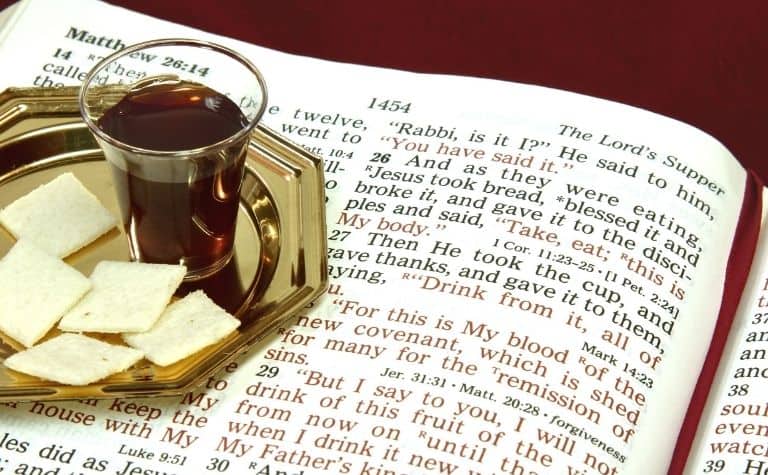Christians throughout the world find life and renewal through the practice of communion. Although most churches offer their members communion regularly, a small minority of traditions don’t. This begs the question: what Christian denominations don’t take communion?
The Religious Society of Friends, also called the Quakers, and The Salvation Army, are two Christian denominations that don’t take communion.
Neither of these traditions opposes other denominations and churches offering communion to their members, but each has its rationale for not providing it at its services.
What reasons do these traditions have for not offering communion to their members? Do non-denominational churches offer communion in their services?
Why has the church disagreed so much about this particular issue? Keep reading to learn answers to these questions and others.

Why Don’t Some Denominations Take Communion?
The practice of communion (also called the Lord’s Supper) is such an integral part of many churches that it can be difficult for some Christians to understand the rationale of certain traditions for not practicing it. (Also see Do All Denominations Go to Heaven?)
Quakers don’t offer communion
The Religious Society of Friends, known as Quakers, do not practice communion because they believe all life is a sacrament. If God is everywhere, they reason, and people can experience his presence at any time, it’s strange to plan a specific time to experience God’s presence.
Quakers try to interact with God in every part of their lives, not just during church services. They emphasize listening to God and others.
Because of this, some Quakers practice a partially silent service, which shares some similarities with the reflective aspects of communion in that congregants are introspective and attentive to the leading of God.
However, unlike communion, there is no leader in a silent, non-programmed church service. Rather, each person shares when they feel the leading of the Spirit to do so.
Many Quakers believe that rituals such as communion distract, rather than focus, a Christian’s mind on God. [1] (Also see What Christian Denominations Believe in Predestination?)
The Salvation Army doesn’t offer communion
The Salvation Army also does not offer communion during its services. There are several reasons for this:
- First, from the start, the Salvation Army has ministered to many alcoholics. Before the temperance movement, all churches used wine, not grape juice, in their communion services. Thus, practicing communion could be counterproductive to the goal of restoring people’s brokenness.
- The Salvation Army also considers communion to be a non-essential practice of the faith. Since there is disagreement on what exactly communion is and how pastors should administer it, they have chosen not to practice it altogether.
- Also, some make the argument that when Jesus tells the disciples during the Last Supper to drink the cup and eat the bread in remembrance of him, he is talking about the entire meal, not just the communion elements.
- Further, the emphasis is on the remembrance rather than on the actual meal itself. Following this line of reasoning, some argue that the church has made a ritual out of something that Jesus never intended. [2]
Also, see Do All Christian Denominations Baptize?

Do Non-Denominational Churches Take Communion?
Non-denominational churches practice communion regularly in their church services. Generally speaking, non-denominational churches are evangelical and relatively conservative theologically.
Since they exist in this theological framework, they view communion as a necessary component in the life of the church, as many other evangelical denominations do. They also tend to view communion as entirely symbolic.
The bread and the grape juice help worshipers remember the crucifixion of Jesus and focus their minds on God. Jesus is especially present in or around the elements. (Also see Catholic vs. Non-Denominational: What’s the Difference?)
Although non-denominational churches typically share these beliefs about the Lord’s Supper, the actual practice of communion varies from church to church. Some churches have communion every week, while others only have it once a month.
Certain pastors prefer that ushers pass the bread and juice down the pews while other church leaders serve the elements to each congregant individually. Part of this variety is due to the nature and origin of non-denominational churches. (Also see What Is a Non-Denominational Church?)
The non-denominational church tradition originates from the Stone Campbell Restoration Movement in the 19th century. This movement desired to return to the example of the early church. To do this, they sought to make the Bible the only source of authority for the organization and practice of the church.
The argument goes that since the Bible is the ultimate source of authority, no individual church needs to rely upon a creed or set of doctrines. All a church needs is the Bible. Non-denominational churches, which agree with this way of thinking, are not under the authority of any denomination.
However, many belong to loose associations of churches that allow, at least in theory, complete autonomy for each local church.
Some critics have pointed out that despite claiming to have the Bible as the only source of authority, most non-denominational churches bring similar biases to their reading of Scripture. Perhaps because of this, non-denominational churches tend to believe similar things about the Lord’s Supper. [3]
Also, see a list of the Largest Christian Denominations: The Top 100.

Why Is There So Much Disagreement About Communion?
There are several possible reasons why Christians have so much disagreement about communion. One reason might be the nature of the biblical passages that talk about the Lord’s Supper.
Ultimately, the practice of communion follows the example of Jesus’ Last Supper with his disciples. The Bible records the event three times in the gospels and once in 1 Corinthians. Jesus tells the disciples that the bread they are eating is his body and drinking is his blood.
Throughout the centuries, Christians have disagreed on how metaphorical or literal these statements should be read. Nor do these passages explain precisely what is happening at the communion table. Jesus merely commands Christians to observe communion. (Also see What Denominations Speak in Tongues?)
As seen above, some Christians are not even certain that communion should happen at all. Because of the room for interpretation in the passage, Christians have divergent views concerning the nature of communion.
Another reason there is so much disagreement has to do with the theological assumptions people enter the discussion with. For example, Protestants do not believe in the Catholic doctrine of transubstantiation.
This doctrine holds that the bread and the wine turn into Christ’s physical body and blood. One of the reasons that Protestants reject this has to do with their beliefs about Jesus’s death on the cross and how that life-giving sacrifice applies to a believer. (Also see What Are the Different Catholic Denominations?)
The question is this: after a person becomes a Christian, does Jesus’s death on the cross need to be repeatedly applied to the believer through the continual practice of Holy Mass, or is a Christian saved once, for all time on the day of their salvation? Protestants agree with the latter theology.
Because of this, Protestants are much more inclined to reject transubstantiation since it seems to support the idea that Christ must continually die on the cross for the believer.
Also, see How to Choose a Church Denomination?
References:
[1] Source
[2] Source
[3] Source
Related Questions
Wondering What Denominations Are Calvinist? Here’s the Answer
The teachings of French pastor and theologian John Calvin (1509-1564) have been a significant part of the Protestant branch of the Christian faith for over 500 years. At the beginning of the 21st...
Arminianism, which is often contrasted with Calvinism, has been an influential theological belief system in Protestant Christianity for 500 years, though some aspects of it are much older. Just like...
